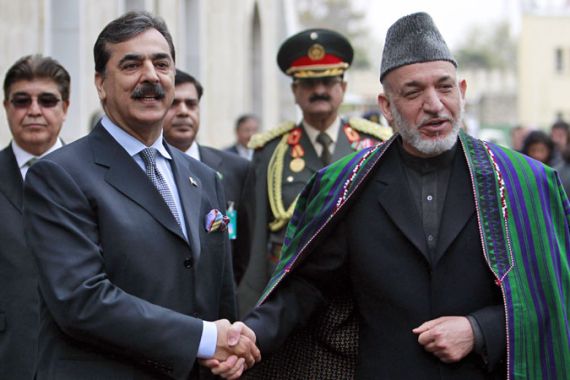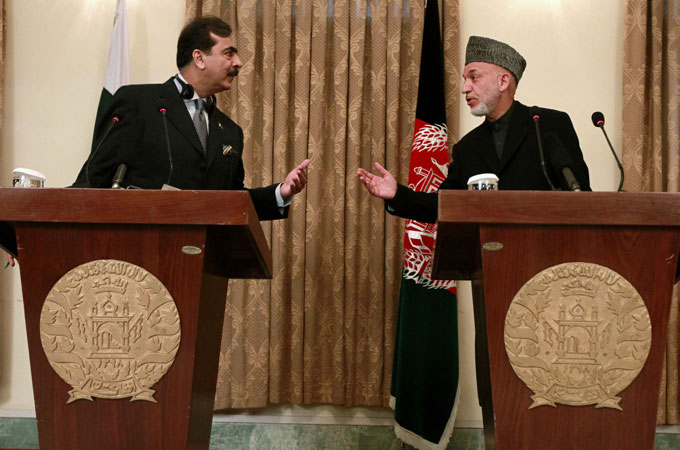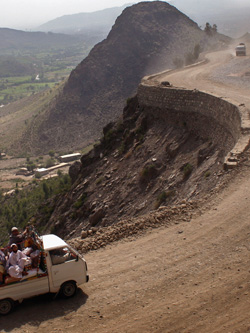Afghanistan and Pakistan: Talking about talks
Ten years after the start of the Afghan war, Karzai says peace will come through negotiations with Pakistan. Will it?

 |
| Talks between Afghanistan’s President Hamid Karzai (R) and Pakistan’s Prime Minister Yusuf Raza Gilani are nothing new and it remains unclear what can be achieved from more discussions to be held later this month in Kabul [REUTERS] |
In the Afghan conflict, talks are not exactly a novel concept. There have been, in the last four years or so, talks about talks, talks about talking about talks, talks about peace, economic co-operation and development and tripartite talks at both military and political levels. There have been secret United Nations talks, undercover contacts with publically “irreconcilable” elements and even peace talks with a “representative of the Afghan Taliban” who turned out to be no more than an enterprising Quetta vegetable seller.
The problem in this conflict has never been a shortage of people talking. It is, rather, one of who they are and what they are saying.
On October 3, Afghan President Hamid Karzai announced that, following the killing of Dr Burhanuddin Rabbani, the head of the Afghan High Peace Council, he was calling off peace talks with the Afghan Taliban to focus instead on bringing Pakistan to the negotiating table.
“The Taliban,” he told the BBC in an interview days later, “will not be able to move a finger without Pakistani support.”
Karzai’s statements come at an interesting time for the rhetoric around the conflict. On Sept 22, just two days after Rabbani’s assassination, Admiral Michael Mullen, the outgoing top US military officer, termed the Haqqani Network – a group that is fighting international forces in Afghanistan and has been held responsible for the audacious Sept 13 attack on NATO’s headquarters and the US embassy in Kabul – a “veritable arm” of Pakistan’s intelligence agency, the ISI.
Mullen went on to indicate that while there were allegedly close links between Pakistan, a US ally, and the US’ direct enemies, the relationship remained important and the country should not be abandoned.
Admiral Mullen’s statements were the clearest indication yet that the US has, finally, lost patience with a Pakistani approach to the conflict that involves discerning between extremist groups based on who they are fighting against and an expectation of an outcome that is contrary to US objectives.
Relations between the two countries are currently so frayed that the recently leaked White House report on Afghanistan and Pakistan for September 2011 touted the kidnapping of a US citizen from Lahore as “provid[ing] an avenue for cooperation between law enforcement authorities”.
Staking irreconcilable positions
Given all of this, what would Afghan negotiations with Pakistan look like? Al Jazeera spoke to Janan Mosazai, a spokesman for the Afghan Ministry of Foreign Affairs, to find out if there is a framework and agenda in place for the talks that President Karzai has proposed.
Mosazai said that while it was “too early to talk about” a specific agenda, the talks would cover “all necessary elements of the broad bilateral relationship that exists between the two countries”.
“As President Karzai has been very clear, the Taliban and other armed opposition groups responsible for the insecurity in Afghanistan have had, and continue to have, their political and military centres and bases on Pakistani soil.”
|
“The Taliban and other armed opposition groups responsible for the insecurity in Afghanistan have … their political and military centres and bases on Pakistani soil.“ – Jana Mosazai, spokesman for the Afghan Ministry of Foreign Affairs |
When asked about how strong a line his country would take on Pakistan’s alleged alleged tacit support for elements of the Afghan Taliban, Karzai’s spokesman said talks would include: “Serious dialogue with the Islamic Republic of Pakistan as to Pakistan’s legitimate concerns and legitimate interests, so that together we can seek and implement a solution to the long years of conflict and suffering in our two countries.”
Reconciliation efforts directly with the Taliban had “received a significant blow” with the killing of Burhanuddin Rabbani, Mosazai said. The assassination indicated that the Taliban “neither have the authority nor the specific address we need for them to engage in meaningful peace negotiations with the Afghan government”.
Yousuf Raza Gilani, Pakistan’s prime minister, is due to visit Kabul later this month, and the subject of peace talks will be “an important part of that visit”. Going forward, the Afghan government would only say that talks would involve “all appropriate and necessary levels”, and would occur “in a new spirit”.
The problem for peace negotiations predicated on the Taliban not having the “authority” to negotiate peace is that it implies that Pakistan does. This, in turn, means that in order for these talks to work, there would need to be a shift in currently mutually irreconcilable strategic perceptions.
For Pakistan, according to a recent report from the Jinnah Institute that canvassed opinions from Pakistani policy makers and experts as well as members of the government, the strategy is shaped by two overarching objectives: to achieve a stable, peaceful Afghanistan, and to ensure that that Afghanistan is not heavily influenced by India, the regional hegemon.
The Pakistani strategy so far has been to attempt to limit Indian influence and to back those amongst the so-called “Quetta Shura” of the Afghan Taliban leadership, the Haqqani Group and Gulbuddin Hekmatyar’s Hizb-e-Islami who could act as agents of Pakistan’s interest in any future Afghan government.
The Afghan position is based on attempting to achieve stability and security while maintaining the legitimacy of the Afghan constitution (and hence the current government).
The Taliban’s position, as far as can be made out from their statements, is that no real negotiations can take place unless all foreign troops first leave Afghanistan. With US withdrawal set for 2014 and an increasing attack capability (as shown by a flurry of high-profile attacks this year), the Taliban and allied groups may well be the least inclined of all three to come to the table.
All roads run through Islamabad
 |
| Pakistan representing the Taliban is a far-fetched idea [GALLO/GETTY] |
“Karzai understands, at last, that Pakistan is the key to peace, and he’s not going to be able to secure any modicum of stability without accommodating Pakistan’s [interests],” says Dr C Christine Fair, an assistant professor at Georgetown University’s Centre for Peace and Security Studies in Washington DC and an expert on the region.
“Why continue to deal with the floor managers instead of the CEOs, right?”
Talat Masood, a retired Lieutenant-General in the Pakistani Army and now a security analyst, says that the Afghan call for direct negotiations with Pakistan is indicative of a view from Kabul that sees Pakistan as having direct operational control over Taliban leaders such as Mullah Omar (a link that Pakistan has repeatedly denied).
For Masood, the only way that any talks between the Taliban and the Afghan government can result in a reasonable result is if both are able to chart a middle course, between the Afghan government’s demand that the Taliban lay down arms and accept the constitution and the Taliban position of fighting till the last foreign soldier leaves the country.
As for Pakistan’s role, the former military officer is sceptical of Pakistan’s ability to bring anyone to the table.
“When it comes to negotiations, the Taliban are very independent in their thinking. They say that even if you’ve given us refuge, it’s probably because it suited you at the time … but it doesn’t mean we are going to compromise,” he said, pointing to the example of how the Taliban refused to hand over Osama bin Laden, al-Qaeda’s then leader, to the US in 2001 following the September 11 attacks.
Rahimullah Yusufzai, a Peshawar-based journalist and analyst who has covered conflict in Afghanistan and Pakistan for decades, is of the same view.
“I don’t think that Pakistan can represent the Taliban, or even that the Taliban would be willing to be represented by them. There is simply no substitute for direct contact between the Taliban and the Afghan government,” he told Al Jazeera.
|
“I suspect … the Taliban will certainly get a ministerial role … [along the southern border of the country with Pakistan].“ – C Christine Fair, professor at Georgetown |
Fair, however, is slightly more pragmatic in the possibilities for outcomes from negotiations.
“I suspect what’s going to happen is that the Taliban will certainly get a ministerial role, that they’re going to get provincial governorships [along the southern border of the country with Pakistan],” she told Al Jazeera. “It’s difficult to imagine Pakistan relenting without the Taliban being given positions in the [central government].”
The Pakistani approach, the report from Pakistani policy makers suggests, has so far focused on attempting to encourage representation of southern and eastern Afghan Pashtuns (who form a large part of the support base for the Afghan Taliban) in the Afghan National Army and the government. The understanding in the Pakistani establishment appears to be that the Pashtuns – and certainly the Quetta Shura and the Haqqani Group – will be more willing to protect Pakistan’s interests in Afghanistan, vis a vis India.
That assumption, however, points to another, rather deeper problem for Pakistan: amongst the Afghan populace (Pashtun or otherwise), the country is not particularly well regarded, based on a perception of it having used Afghanistan for its own ends, without considering its people.
Indeed shortly after General Abdur Rahim Wardak, the Afghan defence minister, made a statement indicating that Pakistan’s ISI had played a role in the assassination of Rabbani, several angry rallies took place in Kabul and other parts of the country – mostly in the north – decrying Pakistan.
India’s role
Pakistani policy is driven by the perception of India, as its primary existential threat a country. The two countries have fought at least three wars with (more, depending on your definition of a ‘war’) since partition in 1947. Pakistan sees any Indian involvement and influence in Afghanistan as being to its detriment, creating the ‘nightmare scenario’ for the geographically narrow country: Hostile neighbours to both its east and west.
As if to drive the point home that India would be central to any negotiations between Afghanistan and Pakistan, President Karzai embarked on a two-day visit to New Delhi on October 4, signing major security and development agreements.
Karzai waved off talk of Pakistani concerns regarding the security deal.
“Pakistan is a twin brother, India is a great friend,” Karzai said in a speech in New Delhi. “The agreement that we signed yesterday with our friend will not affect our brother.”
It may not be so easy, however.
“The fact that Karzai has gone ahead with these security agreements means that everybody has given up on a peaceful solution,” says Yusufzai.
“By siding with the Indians, Karzai has sent a message to Pakistan that since you are not co-operating, I have made my move and now I am aligned with India. By sending Afghan army officials for training to India you are [creating] a big provocation [to Pakistan],” he told Al Jazeera.
|
“Karzai … needs India for investment and development, but this is also the most provocative thing with respect to the Pakistanis.“ – C Christine Fair, professor at Georgetown |
Professor Fair says that: “The Afghan government has traditionally … really played off the India relationship to aggravate Pakistan and they haven’t been terribly successful at it, in the sense that whatever benefits they derive from India they are getting a full headache in return from Pakistan.
“Karzai is in a difficult position, because he needs India for investment and development, but this is also the most provocative thing with respect to the Pakistanis. There’s nothing that Karzai can do that’s going to make the Pakistanis feel confident of India’s role in Afghanistan.”
The isolation, in terms of the security pact with India and the antipathy amongst the populace in Afghanistan, leads to just one conclusion, as Yusufzai points out.
“If you don’t have any friends in Afghanistan, and your only friends are the Taliban, then you are stuck with the Taliban. You cannot betray them and leave them to try to find new friends,” he says, as this would have both major domestic security implications and result in a complete lack of influence in Afghanistan.
For Masood, and other Pakistani analysts and policy makers, the idea of a Pakistani Afghanistan policy predicated on a complete distrust of any Indian involvement in the country is unlikely to succeed, but continues to be the driving force behind decision-making.
The Jinnah Institute report suggests that, given present assumptions, Pakistan’s basic demands in any negotiations with the Afghan government would involve limiting India’s role in the country to a completely transparent set of development agreements, with no co-operation or contact on the security front.
And could Pakistan’s establishment (a term used domestically to describe the country’s powerful military and its intelligence agencies, who are largely understood to formulate major foreign policy) be persuaded to accept a compromise, based on shifting perceptions of the Indian threat?
The short answer, according to virtually every analyst and policy expert this reporter has spoken to over the last six months in Afghanistan, the United States and Pakistan, is a resounding “no”. The inertia of a policy that even insiders privately accept as paranoid at times, is simply too strong, and the benefits of an alternative policy so uncertified, that there appears little possibility of change.
That brings all talk to a halt. Ultimately, without significant changes in strategic perceptions, all use of the phrase “endgame” in Afghanistan would appear to be premature.
Until that time, these talks will be just that: all talk.
Follow Asad Hashim on Twitter: @AsadHashim